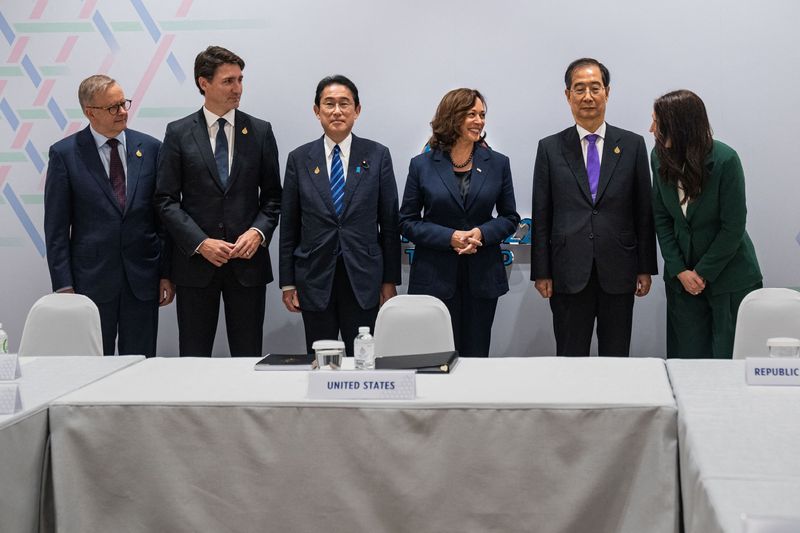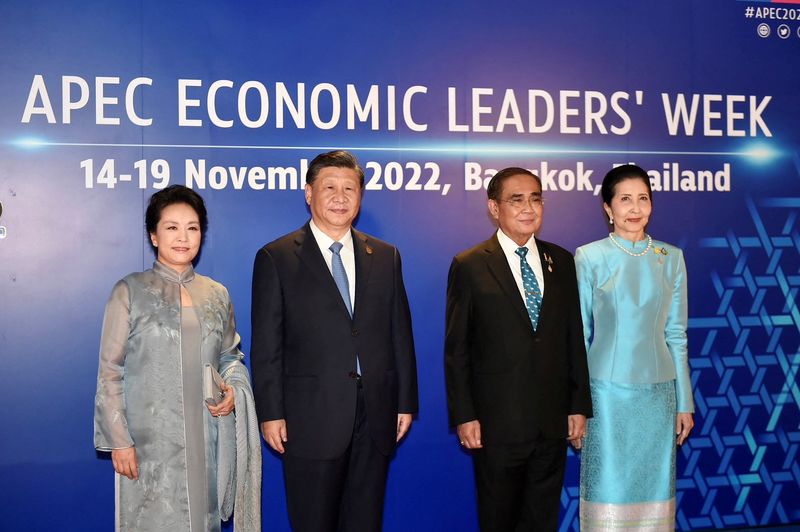By Poppy McPherson and Panu Wongcha-um
BANGKOK (Reuters) -U.S. Vice President Kamala Harris called an emergency gathering of several allies on the sidelines of an Asia-Pacific economic summit, emerging with leaders of five other nations to condemn North Korea after it test-fired an intercontinental ballistic missile.
Harris met with leaders from Australia, Japan, South Korea, Canada and New Zealand on the sidelines of the Asia-Pacific Economic Cooperation meeting after North Korea carried out the missile test, just hours before the summit opened in the Thai capital.
"This conduct by North Korea most recently is a brazen violation of multiple U.N. Security Council resolutions," she said. "It destabilises security in the region, and unnecessarily raises tensions.
The weapon tested on Friday was a "longer range missile...that can hit many, many countries", a senior U.S. administration official said later in the day.
The United States is also in regular contact with China on the North Korean missile launch issue, the official said.
"We do think that Beijing has a role to play," the U.S. official said, adding that the United Nations Security Council should meet and discuss the issue.
Separately, police in Bangkok fired rubber bullets to disperse anti-government protesters as APEC host Thai Prime Minister Prayuth Chan-ocha, opened the conference.
Prayuth in his opening speech urged summit participants to seek sustainable growth and development after economic and social challenges from COVID, climate change and geopolitical rivalries.
"We can no longer live like we did. We need to adjust our perspective, ways of life and ways of doing business," he said to an audience that included Harris and China's President Xi Jinping.
Set up to promote economic integration, APEC groups 21 countries that account for 38% of the global population, and 62% of gross domestic product and 48% of trade.
Prayuth did not refer to North Korea's missile, which Japanese officials said landed just 200 km (130 miles) off Japan and had sufficient range to reach the United States mainland.
Japanese Prime Minister Fumio Kishida, who is in Bangkok for the APEC meeting, told reporters North Korea had "repeated its provocations with unprecedented frequency".
The APEC gathering is the third summit in the region in the past week. A Southeast Asian summit that included China, Japan and the United States was held in Cambodia while the Group of 20 (G20) nations met on the Indonesian island of Bali.
The earlier meetings were dominated by the war in Ukraine as well as tensions over Taiwan and the Korean peninsula.
Campaigners are keen to see leaders address food insecurity, surging inflation, climate change and human rights.
A reminder of grassroots demands came as Thai pro-democracy protesters clashed with police about 10 km (6 miles) from the central Bangkok summit venue.
Videos on social media showed protesters trying to overturn a police car, throwing projectiles and charging at police, while officers in riot gear advanced on them with shields and beat them back with batons.
An official in charge of security for the summit said police fired rubber bullets to disperse about 350 anti-government protesters. Police said they arrested 10 people.
'REFORM DNA'
French President Emmanuel Macron, a special guest at the summit, urged APEC leaders to re-embrace international rules and multilateralism for global peace and stability.
Russia's war in Ukraine was "an aggression against international rules", he said, and countries should address inequality and instability.
"We have to reform the DNA of our economies. All have accepted capitalism and trade but we have to make it more inclusive and sustainable," he said.
At the G20 meeting in Indonesia, countries unanimously adopted a declaration saying most members condemned the Ukraine war, but that also acknowledged some countries saw the conflict differently.
APEC ministers echoed that in a joint statement, saying some members condemned the war.
"There were other views and different assessments of the situation and sanctions," the ministers said, adding that APEC was not the forum to resolve security issues.
Russia is a member of both G20 and APEC but President Vladimir Putin has stayed away from the summits. First Deputy Prime Minister Andrei Belousov is representing him at APEC.
Xi, warning against Cold War tensions in a region that is a focus for competition between Beijing and Washington, said on Thursday the Asia-Pacific was no one's backyard and should not become an arena of big power rivalry,
"No attempt to wage a new Cold War will ever be allowed by the people or by our times," Xi said in remarks at a business event linked to the summit.
Relations between the world's two largest economies have been strained in recent years over issues like tariffs, Taiwan, intellectual property, the erosion of Hong Kong's autonomy and disputes over the South China Sea.

In a move likely to be seen by China as provocative, a U.S. official said Harris would visit the Philippine islands of Palawan on the edge of the disputed South China Sea on Tuesday.
The trip will make Harris the highest-ranking U.S. official to visit the island chain, which is adjacent to the Spratly Islands. China has dredged the sea floor to build harbours and airstrips on the Spratlys, parts of which are also claimed by Brunei, Malaysia, the Philippines, Taiwan and Vietnam.
